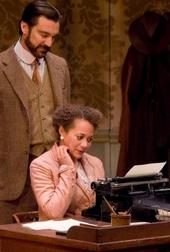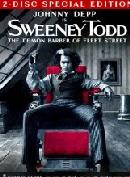HOME PAGE
SITE GUIDE
SEARCH
ADVERTISING AT CURTAINUP
REVIEWS
FEATURES
NEWS
Etcetera and
Short Term Listings
LISTINGS
Broadway
Off-Broadway
NYC Restaurants
BOOKS and CDs
OTHER PLACES
Berkshires
London
California
New Jersey
Philadelphia
Elsewhere
QUOTES
TKTS
PLAYWRIGHTS' ALBUMS
LETTERS TO EDITOR
FILM
LINKS
MISCELLANEOUS
Free Updates
Masthead
Writing for Us
A CurtainUp Los Angeles Review
Of Equal Measure,
| Wilson wants to make the world safe for democracy. What about making America safe for Negroes?
— ” Leonard
|

Michael T. Weiss and Michole Briana White
|
Directed with spry astuteness by Leigh Silverman, Jade’s personal story alternates with scenes about the White House political machine which includes Wilson (Lawrence Pressman), his Chief of Staff Joseph Tumulty (J. D. Cullum), Secretary of State Robert Lansing (Dennis Cockrum) and Christianson who becomes head of the Committee of Public Information (propaganda). The White House scenes discuss the political issues of the day, particularly the impending World War I.
Wilson, idealist, intellectual and Nobel Prize winner, was also a well-documented racist. His government segregation policies were not reversed until the Truman Administration. However, he was never a buffoon and that is a serious flaw in the script. It’s inevitable to compare yesterday’s war administration with today’s and maybe Wilson is not the buffoon Barfield had in mind. The play builds to a powerful ending which contrasts Jade’s personal sacrifice with Wilson’s endorsement of sacrifice "for the betterment of humanity." The glittering Lawrence Pressman plays the Wilson part as written and it’s a pleasure to watch him in action. Tumulty, a liberal, is vividly played by J. D. Cullum with an impeccable Irish accent. Cocksum wrings honesty out of the beleaguered and bewildered Secretary of State and Weiss cuts a handsome figure as the one-dimensional character he’s given, a racist who oppresses and sexually harasses his secretary Jade while resisting the love he comes to feel for her.
The scene in which Tumulty is imprisoned and beaten by a Mr. Plank seems unlikely but works if viewed as a picture by Barfield of the pressure put on politicians to fall in line. It’s particularly astute when Wilson enters the jail cell, ignores Tumulty’s "Why am I here?" and simply declares he needs him.
Jade’s personal story, though it follows a predictable path, holds our attention, largely through the sympathetic power of Michole Briana White’s interpretation. Jade’s home life includes dialogues with her kinsman Leonard (Joseph C. Phillips), a reporter, and her brother Eugene. Leonard is a character written to represent a point of view and doesn’t give Phillips, a capable and charming actor, much to work with. Warren has a better shot as young Eugene, the artist who doesn’t want to be a portraitist and succumbs to the flattery of being a White House spy.
Barfield has a sure sense of dramatic suspense even when her content is shaky. She's very much a writer to watch.
|
OF EQUAL MEASURE Playwright: Tanya Barfield Director: Leigh Silverman Cast: Michole Briana White (Jade Kingston), Lawrence Pressman (Woodrow Wilson), J. D. Cullum (Joseph Tumulty), Dennis Cockrum (Robert Lansing), Joseph C. Phillips (David Leonard), Christopher O’Neal Warren (Eugene Kingston), Michael T. Weiss (Edward Christianson), T. Ryder Smith (Mr. Plank), Scott Dawson, Michael Hyland (Ensemble) Set Design: Richard Hoover, Sibyl Wickersheimer Lighting Design: Lap Chi Chu Costume Design: Rachel Myers Sound Design: Adam Phelan Running Time: Two hours twenty minutes with one intermission Running Dates: June 29-July 27, 2008 Where: Kirk Douglas Theatre, 9820 Washington Blvd, Culver City. Reservations: (213) 628-2772 Reviewed by Laura Hitchcock on July 11, 2008. |
|







